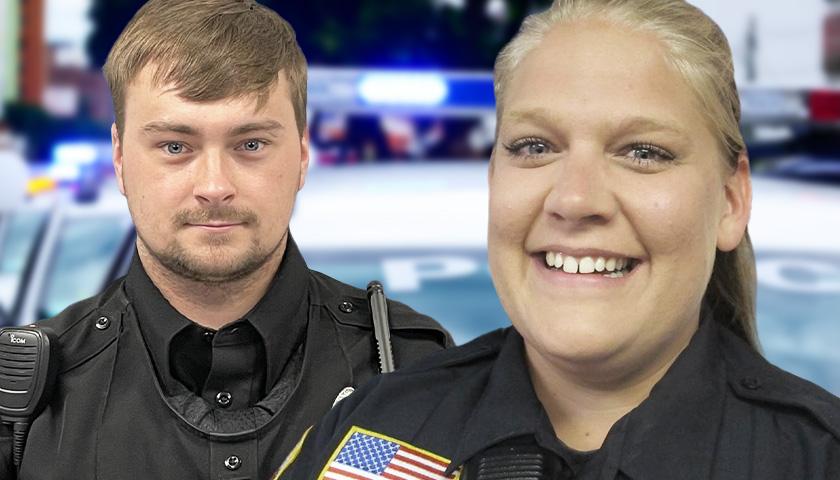The Wisconsin Department of Justice on Monday identified the two northern Wisconsin police officers killed over the weekend during a traffic stop, as two small communities continued to mourn.
Chetek Officer Emily Breidenbach, 32, and Cameron Officer Hunter Scheel, 23, were fatally shot early Saturday morning by Glenn Douglas Perry, 50 in the Village of Cameron, according to the DOJ.
The officers were pronounced dead at the scene. Perry, of New Auburn, WI, was transported to a hospital, where he later died.
“The officers were conducting the traffic stop based on a warrant and to check [the] welfare of the driver, Glenn Douglas Perry, age 50, following notification of concerning behavior,” the DOJ press release states. “During the traffic stop, gunfire was exchanged.”
A warrant for Perry’s arrest had been issued on March 30 in Barron County Court, as part of a divorce case, online court records show.
Perry had been found guilty of disorderly conduct in a domestic abuse case in 2020 and fined $367.50, according to court records. Charges of battery and bail jumping were dismissed.
The state Division of Criminal Investigation is leading the investigation, assisted by the Barron County Sheriff’s Office, Rusk County Sheriff’s Office, Wisconsin Department of Natural Resources, Wisconsin State Patrol, Minnesota Bureau of Criminal Apprehension, the Federal Bureau of Investigation, Wisconsin State Crime Lab, a DCI Crime Response Specialist, and Cameron Fire Department.
Jim Palmer II, executive director of the Wisconsin Professional Police Association, said the loss of the two officers represents the worst nightmares of law enforcement officials and their loved ones.
“What began as a traffic stop ended with two officers paying the ultimate sacrifice,” he told The Wisconsin Daily Star.
Dedicated Officers
Breidenbach had five years of law enforcement service; Scheel less than a year, according to the DOJ. Scheel had graduated from the Law Enforcement Academy in December.
Breidenbach began her law enforcement career with the Stoughton Police Department in southern Wisconsin, where she served for nearly a year before joining the small Chetek Police Department — staffed by just six full-time officers, two part-timers and an administrative clerk. It was a homecoming, working for the police department where her father, Robert Breidenbach, once served as chief of police. He retired in 2005.
“Her compassion for the community and the children of the community of Chetek was remarkable,” the police department said in a statement.
Scheel served six years with the National Guard, according to a press release from the Cameron Police Department. He also served in Afghanistan. He was part of a small town police force with just a few officers.
“We had so much planned for our future and looked forward to growing old with one another,” Scheel’s girlfriend Camryn Gosdeck wrote on Facebook. “Because of this, I am absolutely heartbroken and never knew I could feel such an immense pain as having my other half ripped from me. My heart hurts for him, for his family and anyone who had the pleasure of knowing him.”
Chetek Police Chief Ron Ambrozaitis thanked the community for its continued support.
It Hits Hard
The deaths of Breidenbach and Scheel come two months after Milwaukee Police officer Peter Jerving was shot and killed in the line of duty.<
“It hits the department hard. We’re a department of about 1,400 officers. I can’t imagine how it is in a small county where all of the officers are working together,” Andrew Wagner, president of the Milwaukee Police Association told The Wisconsin Daily Star.
“As soon as you get that call, your heart just sinks,” Wagner added. “The first call you get is, ‘Officer down.’ You pray for their survival. When that’s doesn’t happen, you pray for strength for the family and you support them however you can can to get them through that.”
Wagner said Milwaukee police continue to deal with the dangers of a defunding movement. The force has been cut by more than 200 officers in recent years, he said, adding that he is hoping the pendulum is swinging back to an emphasis on community safety.
Palmer said he believes the defund the police movement has been pretty well “dispelled.” That’s critical, he said, because indicators point to policing becoming more dangerous, not less. The number of assaults on officers in the line of duty in Wisconsin increased by 42 percent between 2017 and 2020, the most recent data available. Staffing statewide is at its lowest level since 2008, when policing employment levels began being tracked.
“We’ve seen [the defund movement] take on a few different shapes and models, from ‘reimagining’ the police to reinvesting,’ Palmer said. “Our polling has found that the public support resources for mental health officers, body cameras and social workers, but not at the expense of officers on the street.”
– – –
M.D. Kittle is the National Political Editor for The Star News Network.
Photo “Emily Breidenbach” by NYPD NEWS. Photo “Officer Hunter Timothy Scheel” by NYPD NEWS. Background Photo “Police Car” by diegoparra.





